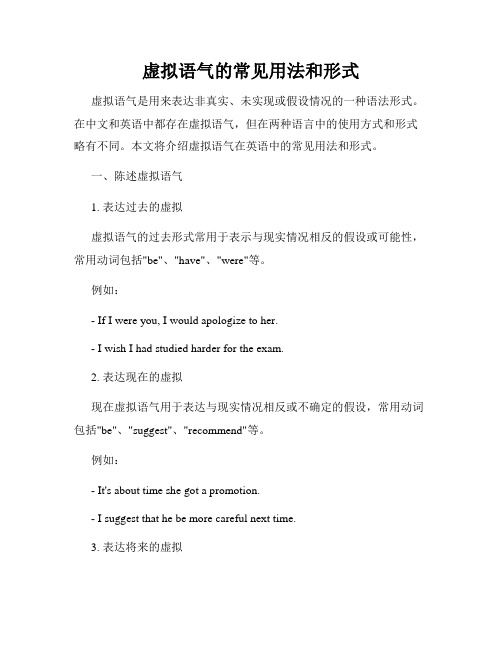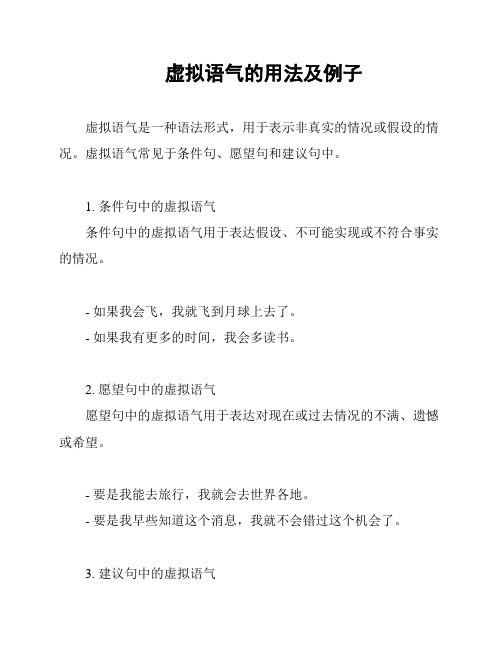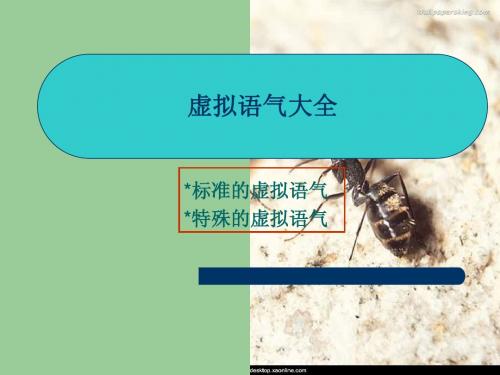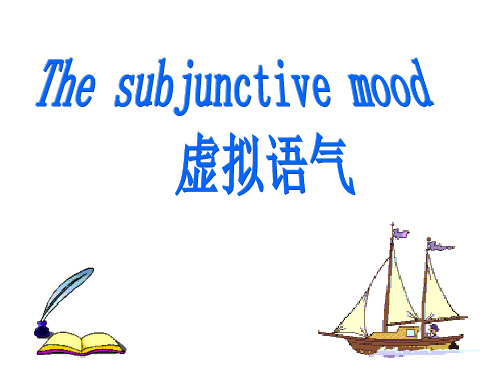虚拟语气
虚拟语气的常见用法和形式

虚拟语气的常见用法和形式虚拟语气是用来表达非真实、未实现或假设情况的一种语法形式。
在中文和英语中都存在虚拟语气,但在两种语言中的使用方式和形式略有不同。
本文将介绍虚拟语气在英语中的常见用法和形式。
一、陈述虚拟语气1. 表达过去的虚拟虚拟语气的过去形式常用于表示与现实情况相反的假设或可能性,常用动词包括"be"、"have"、"were"等。
例如:- If I were you, I would apologize to her.- I wish I had studied harder for the exam.2. 表达现在的虚拟现在虚拟语气用于表达与现实情况相反或不确定的假设,常用动词包括"be"、"suggest"、"recommend"等。
例如:- It's about time she got a promotion.- I suggest that he be more careful next time.3. 表达将来的虚拟将来虚拟语气用于表达与现实情况相反或不可能实现的假设,常用动词包括"should"、"were to"等。
例如:- If I should win the lottery, I would buy a big house.- If it were to rain, the event would be canceled.二、命令虚拟语气当表示一种命令、建议或要求时,常使用虚拟语气来显得客气或委婉。
例如:- I suggest that you arrive on time for the meeting.- It's important that he be there for the ceremony.三、愿望虚拟语气愿望虚拟语气用于表达对过去、现在或将来的愿望、期望或希望。
虚拟语气的用法及例子

虚拟语气的用法及例子
虚拟语气是一种语法形式,用于表示非真实的情况或假设的情况。
虚拟语气常见于条件句、愿望句和建议句中。
1. 条件句中的虚拟语气
条件句中的虚拟语气用于表达假设、不可能实现或不符合事实的情况。
- 如果我会飞,我就飞到月球上去了。
- 如果我有更多的时间,我会多读书。
2. 愿望句中的虚拟语气
愿望句中的虚拟语气用于表达对现在或过去情况的不满、遗憾或希望。
- 要是我能去旅行,我就会去世界各地。
- 要是我早些知道这个消息,我就不会错过这个机会了。
3. 建议句中的虚拟语气
建议句中的虚拟语气用于表达对某种行动或情况的建议、要求或命令。
- 尽量少吃甜食,要不然你会发胖的。
- 要是你需要帮助,尽管告诉我。
虚拟语气通过使用虚拟动词和特殊的句子结构来表达。
在中文中,通常使用“如果……就……”、“要是……就……”、“如果能……就……”等句式来表示虚拟语气。
需要注意的是,虚拟语气在口语和书面语中的使用有所不同。
在口语中,虚拟语气的使用相对较少,而在正式的书面语或文学作品中,虚拟语气的使用相对较多。
希望本文对你理解和运用虚拟语气有所帮助!。
虚拟语气用法总结

概念:谓语v用不同的形式表示说话人的不同意图,这 种形式称为语气。语气分三种: 1.陈述语气:用来陈述一个事实,或提出一种看法,有 肯定、否定、疑问、感叹等形式。
He is late for class. What fun!
He is not interested in classical music. 2.祈使语气:用来表示请求、邀请、命令、警告或劝告 等(动词常用原形) Don’t be late! 3.虚拟语气:表示说话人所说的不是事实,而是一种假 设、愿望、怀疑或推测。
2.If I were you, I would accept his advice. Were I you,……
3.If it rained/should rain/were to rain tomorrow, I would stay at home.
Should it rained tomorrow/ Were it to rain tomorrow,
(或用could have done) 与将来事实相反 could/would/might + do/be
I wish (that)he_w_o_u_ld_/_c_ou_l_d_/m__ig_h_t v_i_si(tvisit) us tomorrow.
I wish (that) he__v_i_si_te_d___(visit)us today. I wish he_h_a_d_v_i_si_t_ed__u_s/_c_o_u_l_d_h_a_v_e_v_is_i_te_d__u_s (visit) us yIfeosntelyrdyaoyu. __h_a_d_li_s_te_n_e_d___ (listen)to our advice!
虚拟语气大全

3. 含有were, had, should, could 的从句 省略if法 If I had a lot of money,
Had I a lot of money, If I would buy I could do this it, house. 如果我能做这件事情,我一定会做的。 Could do it, I would surely do it. IfI the Black Death should reappear , 万一黑死病再次出现,我们该怎么办? Should the Black Death reappear, what should we do?
有一些动词(表建议,命令,请求,要求)后 的从句
Ask, command, decide, demand, desire(希 望), insist, move(动议), order, direct(命令), propose, request, recommend(推荐,建议), suggest, urge(敦促), rule(裁定)…. 特别是说明:由这些动词演变过来的形容词和 名词后的从句的动词与这些动词后的从句谓语 动词用法一样。比如suggest 和suggestion 后的从句的动词都应该用(should) 动词原 型。
句型:it is + 一系列形容词和名词 + that …
-
一系列形容词和名词: important, desirable, necessary, essential, imperative, vital, natural, strange, incredible, my wish, a pity It is natural that mothers should love their children It is natural that mothers love their children (其中should可以省略)
虚拟语气讲解

What would have happened, _____ as far as the river bank? (01 上海) A. Bob had walked farther B. if Bob should walk farther C. had Bob walked farther D. if Bob walked farther
C
二、虚拟语气在名词从句中的运用 (1)用于宾语从句 1、wish 后面的宾语从句中。 一般用虚拟语气,表示一种不可能实现的愿望。其谓 语动词形式为:
表现在
表过去
过去时
过去完成时
表将来 would, might, could+动词原形 I wish (that) I were a bird.
I wish (that) I had seen the film last night. I wish (that) I would\could go.
虚拟语气
虚拟语气的概念
虚拟语气是一种特殊的动词形式,一是用来
表示说话人所说的话不是一个事实,而是一 种假设、猜测、怀疑等(在条件从句中或让步 状语从句中);一是表示说话人的愿望、要求、 命令、建议等 (在宾语从句、表语从句、同位 语从句)。
虚拟语气在 在条件从句中
虚拟条件句
与现在 事实相 反的假 设 与过去 相反的 假设 与将来 相反的 假设
2. 在某些动词后的宾语从句中需用should+动词原形的 虚拟语气形式。“should”可以省略。 常见的动词有: 一个坚持insist; 两个命令order, command ; 三条建议suggest , advise, propose; 四项要求demand, request, require, ask; 另外还有prefer
虚拟语气

1.过去式 过去式 would/could/should 将来 2. should+ V.(原) 原 /might +V.(原) 原 3. were to do
4. It’s (about/high) time +that
过去时(did/were) 过去时 Should(不省) +V.
你该走了。 你该走了。
It’s high time that you went. It’s high time that you should go.
我们该去
It’s time that we went to bed.
★
现在: 现在:过去时 3. as if /though + 从句 过去: 过去: 过去完成时
★ ★
She loves the baby as if it were her own son. I remember the whole thing as if it had
happened yesterday.
3) What ____ last night if you ____ to do your B washing? A. would you do, hadn’t had B. would you have done, hadn’t had C. would you do, didn’t have D. would you have done, didn’t have 4) If I had hurried, the train ____ . D A. would catch C. had caught B. would have caught D. would have been caught
8种虚拟语气
虚拟语气八种虚拟结构:1、在含有表建议、命令、要求、请求、决定、义务等语气的句中借助should(可省略)使用虚拟语气。
1) 动词后的宾语从句2) 名词后的表语从句3) 名词后的同位语从句4) it +be +v-ed that 后的从句5) It +be +形容词+ that后的从句• she suggested that we (should) set off early the next day•My advice is that more trees should be planted in our school.•They won’t accept the suggestion that we should cut all the trees.•It is ordered that all the troops (should) withdraw three miles away.•It is essential(绝对必要的)that he ( should ) your home work first.常见用虚拟语气的词语:1)动词:command, demand, desire(希望), insis t(坚持), order, propose(提议), recommend (推荐), request(要求), require(要求), sugges t(建议)2). 分词:It is proposed that …(人们建议……) It is desired that … (最好、需要……) ,It is requested that … (人们要求……)It is suggested that … (有人建议……) ,It is recommended that …(有人推荐……)It is demanded that …(根据要求……) ,It is decided that …(已经决定……)It is arranged that … (已经安排……) 等等。
虚拟语气
虚拟语气一、虚语语气表示说话人的一种愿望、建议、命令、要求。
有时是一种非真实的假设、料想,或是不可能实现的与事实相反的愿望。
二、虚拟语气的种类1. if引导的虚拟条件句(退一步,海阔天空)(1)与现在相反If + did (were), wmcs + do①如果我是你,我会再试一次。
If I were you, I would try it again.②如果我有一百万美元,我会买下这架飞机。
If I had one million dollars, I would buy the plane.(2)与过去相反If +had done sth, wmcs + have done①如果他努力学的话,他就会通过考试。
If he had worked hard, he would have passed theexamination.②要是当时我和她结了婚的话,那我是很不幸的。
If I had married her, I would have been unhappy.(3)与将来相反If + didwere to do , wmcs + doshould do译:如果他明天来的话,我会告诉他.If he were to come here tomorrow, I would tell him.练一练:①If you __________tomorrow, you _________ find the new manager working in the office.A. should come; wouldB. would come; wouldC. will come; shouldD. comes; might②If the parents ______at the hospital earlier after the accident, the child would have been saved.A. arrivesB. arriveC. had arrivedD. has arrived③---If he ________; he ________that food.---Luckily he was sent to the hospital immediately.A. was warned; would not have takenB. had been warned; would not have takenC. would be warned; had not takenD. would have been warned; had not taken 2. 虚拟句易考点(1)省略if,倒装的条件句:如果从句中有were, had, should时, 可把从句倒装①If I were you, I would try it again.→Were I you, I would try it again.②If he had been there yesterday, he would have seen thefilm.→Had he been there yesterday, he would have seen thefilm.③If it should snow tomorrow, we wouldn’t go out.→Shou ld it snow tomorrow, we wouldn’t go out.练一练①_________the exam, he would have attend a college.A. If he passedB. Had he passedC. Were he passedD. If he should pass②_______five minutes earlier, you could have seenthem off.A. If you should arriveB. If you arriveC. Had you arrivedD. Should you arrive③________it rain tomorrow, we should have to putoff the visit to the Science Museum.A. WereB. shouldC. wouldD. will(2)wish did/were 现在If only had done 过去as if wmc do 将来①我要是记得地址就好了。
虚拟语气英语知识点总结
虚拟语气英语知识点总结一、虚拟语气的概念。
虚拟语气是一种特殊的动词形式,用来表示说话人所说的话不是一个事实,而是一种假设、愿望、怀疑、猜测或建议等。
二、虚拟语气在条件句中的用法。
1. 与现在事实相反的虚拟条件句。
- 结构:从句(If + 主语+ 动词的过去式(be动词一般用were)),主句(主语+ would/should/could/might+动词原形)。
- 例如:If I were you, I would study harder.(如果我是你,我会更努力学习。
实际上我不是你)2. 与过去事实相反的虚拟条件句。
- 结构:从句(If+主语+had+过去分词),主句(主语+would/should/could/might + have+过去分词)。
- 例如:If he had taken my advice, he would have passed the exam.(如果他听了我的建议,他就会通过考试了。
实际上他没听建议,也没通过考试)3. 与将来事实相反的虚拟条件句。
- 结构:从句(If+主语+动词的过去式/should+动词原形/were to+动词原形),主句(主语+would/should/could/might+动词原形)。
- 例如:If it rained tomorrow, we would stay at home.(如果明天下雨,我们就会待在家里。
明天是否下雨还不确定,但这是一种假设情况)- 或者If he should come tomorrow, I would tell him the news.(如果他明天来,我就会告诉他这个消息)- 以及If I were to see her tomorrow, I would give her the book.(如果我明天见到她,我就会把书给她)三、虚拟语气在宾语从句中的用法。
1. wish后的宾语从句。
- 表示与现在事实相反的愿望,从句谓语动词用过去式(be动词用were)。
虚拟语气
虚拟语气
何为虚拟语气?
• 虚拟语气是一种动词形式,表示说话人的 一种愿望、假设、怀疑、猜测、建议等含 义,它所表示的含义不是客观存在的事实。 如: • If I were you, I‘d take them away.如果我是 你的话,我就会带走他们。 • He suggested that our class should be divided into five groups.他建议说我们班应 该分为五个小组。
虚拟语气在状语从句中的用法
• •
• • •
A 在条件状语从句中的用法:虚拟语气在表示条件的状语从句中的使用最常见。
表示与现在事实相反的假设:若表示与现在事实相反的假设,条件从句用一般过去时, 主句中用“would/should/might+动词原形”的形式:If my brother were here, everything would be all right.要是我哥哥在这,一切都没有问题了。 表示与过去事实相反的假设:若表示与过去事实相反的假设,条件状语从句中用过去完 成时,主句中用谓语动词“should/would/could/might +have done”的形式:If I had set off a little earlier, I would have caught the train. 表示与将来事实相反的假设:若表示与将来事实的假设,条件状语从句中用一般过去时、 should+动词原形或were to+原形,主句中谓语动词用should/would/could/might+动词原形的形式: If it were fine tomorrow, I would go shopping.如果明天天气好,我就去买东西。 错综时间条件句:错综时间条件句指条件状语从句表示的动作发生的时间不一致,即条 件从句表示与过去事实相反,主句表示与现在事实相反;或条件从句表示与现在事实相反,主句表 示真实情况:If he had set out earlier, he would be home tomorrow.如果他早点出发的话,现在就 已经到家了。 含蓄条件句:有时为了表达的需要,在虚拟语气中并不总是出现if引导的条件句,而通 过其他手段如介词(短语)with ,without ,but for,副词otherwise,或其他从句来表示虚拟语气的条件: What should I do with a million dollars? 如果你有一百万美元,你会怎么做? We could not have finished the work ahead of time without your help.如果没有你的帮助,我们不会提前完成任务。 But for the rain, we could have held the sport meet.如果不是下雨的话,我们就开运动会了。
- 1、下载文档前请自行甄别文档内容的完整性,平台不提供额外的编辑、内容补充、找答案等附加服务。
- 2、"仅部分预览"的文档,不可在线预览部分如存在完整性等问题,可反馈申请退款(可完整预览的文档不适用该条件!)。
- 3、如文档侵犯您的权益,请联系客服反馈,我们会尽快为您处理(人工客服工作时间:9:00-18:30)。
②If only I had gone by taxi,then I could have caught the train.
★在一些表示祝愿的话语中用虚拟语气(多用动 词原形) eg.①Long live peace! ②May you enjoy many years of health and happiness! ③God bless you!
• (2)含蓄条件句:虚拟的条件有时可以不 用条件从句来表示,而是暗含在上下文 中。常用来表示含蓄虚拟条件的词或短语 有otherwise,without,suppose,but for(要 不是)等。
eg.①We were delayed at the airport.Otherwise we would have been here by lunchtime. ②Without my advice,he would have failed. ③Suppose you had a million pounds how would you spend it?
eg.If he had taken your advice,he wouldn’t have made such a bad mistake.
• (3)与将来可能情况相反或实现可能性不大: 从句的谓语可以用动词的过去式,也可用 were to/should +动词原形,主句的谓语用 would/should/could/might+动词原形。
(be的过去式通常用were。)
eg.①If you lived there for a while,you would change your mind about that place. ② If he were to/should be given another chance,hecould certainly do a much better job.
• 注意:虚拟条件句谓语中有were /had /should时,可将if 省略,而将were/had /should提前。 eg.①Were it ont for their help,we would be in serious trouble. ② Had we started a bit earlier,we would not have missed the rain. ③Should he leave for Paris today,he could get there by Friday.
④But for the rain we would have had a nice holiday.
• 即学即练:用括号内动词的正确形式填 空。 would have crash 1、I ______________(crash)the car but for your warning.
should go 2、I demand that John _________(go)there at once.
★It only (但愿、要是……就好了)主要用在虚拟 语气中,用以表达愿望或非真实条件,其后所 虚拟语气的时态与 wish 后所接时态的情况相同
【注意】if only 通常独立使用,没有主句。
eg.①If only they would tell me what they’ve decided.
★在would rather 后的宾语从句中,谓语常用过去 时表示对现在或将来情况的虚拟,用had+过去 分词表示对过去情况的虚拟。
eg.①I would rather my daughter attended a public school. ②“Do you mind if I smoke?” “Well,I ’d rather you didn't.”
3、It’s high time westopped _______(stop) treating hin like a child. knew 4、If only I _____(know) her phone number!Then I could call her right now.
5、Tom says he’s coming to see me came tomorrow.I ’d rather he _____(come)taday.
拓展:特殊的虚拟条件句
• (1)错综时间条件句:虚拟条件句从句谓 语和主语谓语表示的动作在时间上并不一 致。
eg.①If I were a man they would have given me the job. ②If you had taken my advice ,you wouldn’t be in such trouble now.
would realize 6、I wish he ___________(realize) that good service was the most important thing to cusumers.
• (二)虚拟语气的其他用法: ★在表示请求、建议、命令、愿望的名词性 从句中,谓语用should+动词原形或只用动 词原形。 eg.①We specifically requested that you (should) be 宾从 infomed. ②My suggestion is that we (should) wait a while 表从 before we make any firm decisions. ③He gave orders that the work (should) be started immediately. 同位语从句 ④It was proposed that the president (should) be elected for a period of two years. 主从
虚拟语气
• 虚拟语气用来表示说话人所说的话并不是 事实,而是一种假设、愿望、怀疑或推测。
ቤተ መጻሕፍቲ ባይዱ
• (一)虚拟语气可以用于条件状语从句、 方式状语从句和名词性状语从句中
1、虚拟语气在条件状语从句中的用法
• (1)与现在事实相反:从句的谓语用 动词的过去式,主句的谓语用 would/should/could/might+动词原形。 (be的过去式通常用were。)
3、虚拟语气在wish宾语从句中的用 法
在wish后的宾语从句中,虚拟语气用法如 下:
• (1)表示现在不能实现的愿望,从句的谓 语用动词的过去式(be的过去式通常用 were。)
eg.①I wish I had more time. ② I wish I were taller.
• (2)表示过去没有实现的愿望,从句的谓 语用had+过去分词。
2、虚拟语句在as if/as though引导的 表语从句或方式状语从句中的用法
• 在以as if/as though引导的表语从句或方式 状语从句中的谓语形式和一般虚拟语气差 不多,表示现在情况时用动词的过去式, 表示过去情况时用had+过去分词。(be的过 去式通常用were。)
eg.①He behaves as if he were mad. ② It seemed as if the end of the world had come. ③He talked about Rome as though he had been there himself.
eg.I wish you hadn’t told me all this.
• (3)表示将来不能实现的愿望,从句的谓 语用would/could/might+动词原形。
eg.I wish you would stay a little longer.
• 即学即练:用括号内动词的正确形式填 空。 1、I wish I __________(choose)a different had chosen career. career:职业 asks 2、If a customer ________(ask) me to suggest a model,I am usually quite honest and recommend one of the cheaper models.
would return 4、If customers got good service,they ____________ (return) to the store and spend more money.
should change 5、He ____________(change) his mind if I said that to him.
③Now I regret going to the cinema with him.I would rather that I had stayed at home.
★在It is (high/about)time (该是……的时候)后的 定语从句中,谓语要用虚拟语气(多用动词过 去式表示)
eg.①It’s (high) time you stopped fooling around and started looking for a job. ②It’s (about) time you cleaned your room!
高考题:
1、 We __________ back in the hotel now if you didn’t lose the map. A. are B. were C. will be D. would be 2、If Mr. Dewey _____ present, he would have offered any possible assistance to the people there. A.were B.had been C.should be D.was
